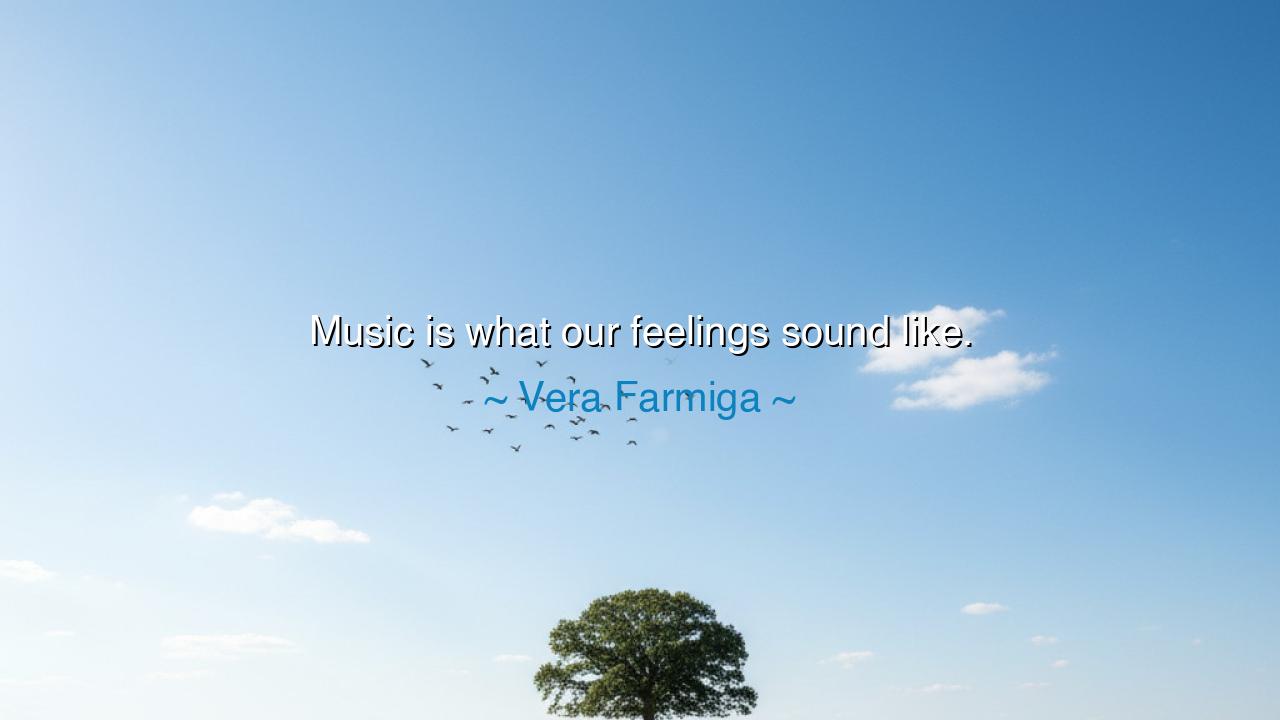
Music is what our feelings sound like.






The words of Vera Farmiga—“Music is what our feelings sound like.”—fall upon the heart like a bell ringing in the stillness. In this simple yet profound truth, she reveals the eternal power of music, which takes the invisible and makes it audible, which transforms the hidden currents of the soul into a voice the world can hear. Feelings may dwell in silence, in depths too deep for words, but when clothed in melody, they find form, they find wings, they become immortal.
From the beginning of time, humanity has used music to express what could not be spoken. The lullaby of a mother cradling her child, the war drums that thunder before battle, the hymns that rise in temples—all are the soul’s feelings poured into sound. Words may deceive, but the melody betrays the truth. One may say “I am not afraid,” yet the trembling note of his song will reveal the storm within. So Farmiga’s saying carries the weight of all ages: music is the mirror of the soul, unflinching and true.
History gives us countless witnesses. When Ludwig van Beethoven, stricken by deafness, could no longer hear, he did not abandon music. Instead, he poured his anguish and triumph into symphonies that still shake the earth. His Ninth Symphony, with its hymn to joy, was not merely composition—it was his feelings transfigured, his inner cry made sound. Though his ears were closed, his soul sang louder than ever. Here we see Farmiga’s wisdom embodied: music gives voice to the voiceless heart.
The ancients themselves honored this. The Greeks believed in the doctrine of ethos, that music shapes character because it springs directly from the soul. For them, the flute could stir passion, the lyre could soothe sorrow, and the chorus could unite a people. Plato himself declared that if one would understand a people, one should listen to their songs. For in those sounds, their joys, sorrows, fears, and hopes are revealed. Thus, feelings become sound, and sound becomes the very essence of a culture.
Consider also the songs of enslaved peoples in the Americas. Stripped of freedom, beaten down by chains, they yet found power in music. Their spirituals carried their grief, their longing for deliverance, and their hope for a brighter day. “Swing Low, Sweet Chariot” was not just a melody—it was sorrow, it was faith, it was the heartbeat of a people who refused to let their spirits be broken. Through music, their feelings crossed centuries, still heard today, still alive.
The meaning of Farmiga’s words is that music is not decoration, not mere entertainment, but a sacred channel through which we encounter the truth of ourselves. When joy swells too great for words, we sing. When grief is too heavy for speech, we weep in song. When love is too deep for language, we let melody bear it. To hear music is to hear the human heart itself, stripped of disguise, glowing with honesty.
The lesson for us is this: do not ignore the gift of music in your life. When you cannot express your own feelings, let music speak for you. When you wish to understand another, listen to their songs. Use music not only for pleasure, but for healing, for reflection, for unity. Let it be your companion in both celebration and sorrow, for it will always speak the truth of the heart.
Practically, this means filling your life with music that uplifts, inspires, and heals. Sing without shame, even if only to yourself. Listen deeply, not just with your ears but with your spirit. And remember: every song is a soul speaking. When you honor music, you honor humanity itself. Thus let Vera Farmiga’s words endure: “Music is what our feelings sound like.” And when you truly listen, you will not only hear sound—you will hear the very voice of the human heart.






AAdministratorAdministrator
Welcome, honored guests. Please leave a comment, we will respond soon